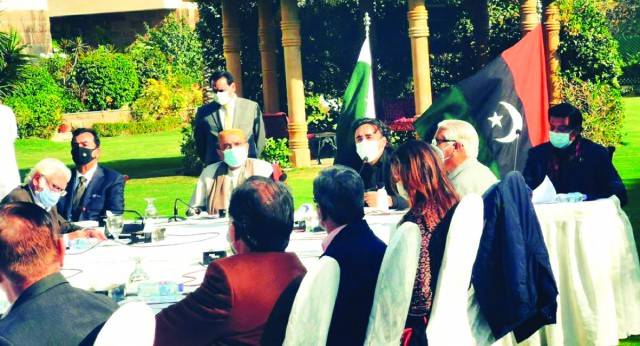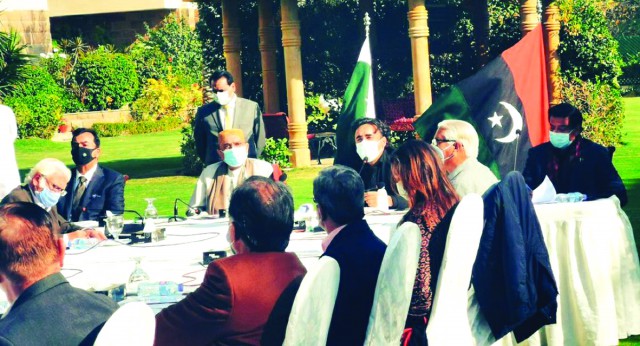
The main topic of discussion before the central executive committee of the PPP in Bilawal House, Karachi last Tuesday was the mode, manner and timing of resignations from the assemblies in accordance with the decisions taken at the All-Parties Conference (APC) held in Islamabad on September 20. Resignations have dominated the national political discourse for the past few weeks and it was natural that it was the most dominant theme of the meeting.
The six-hour long robust discussion among some 60 senior party leaders was held in the lawns of Bilawal House, with Bilawal Bhutto presiding and his father Asif Zardari sitting at some distance and only occasionally interjecting. Besides those physically present, about a dozen others participated virtually via satellite link from various cities within the country and across the seas. The meeting was moderated by Chairman Bilawal Bhutto, who invited members one by one to not only speak their mind but also to answer some specific questions. Arguably it was one of the most focused meetings of the highest decision taking body of the party.
The Quranic verse with which it opened said: “O, my Sustainer! Cause me to enter (upon whatever I may do) in a manner true and sincere, and cause me to leave (it) in a manner true and sincere, and grant me, out of Thy grace, sustaining strength.”
To begin with, the Islamabad APC’s unanimous action plan was read out to set the tone, direction and thrust.

There was complete unanimity on (i) submission of resignations to the party chairman by December 31 (ii) mounting serious and effective challenge to the “puppet, selected and illegitimate” government at every forum inside and outside the parliament, (iii) no confidence motions in the National and Provincial assemblies, (iv) agitating judicial platforms on specific issues that were also identified (v) participation in by polls and Senate elections and (vi) no talks with Imran unless he resigned.
The APC action plan had decided to “exercise options of no confidence motions in the parliament as well as collective resignations from assemblies at the right time” to force out Imran Khan. The discussions in the CEC, therefore, focused largely on what was the right time to resign from the assemblies for maximum effect.
As participants were invited to speak, they were asked to give opinions on some specific questions that had arisen during the discussions. Minutes of the highly structured meeting were also recorded to serve as guide. Who said what, the reasons advanced in favor or against contrasting theories, framing of the political issues and discussion on the role of non-political players and state agencies have all been recorded as a valuable archive of the evolution of political thought processes in the party.
However, as Bilawal Bhutto later said in his press talk that night that everyone’s right to secrecy did not permit him to talk about it publicly.
Suffice it is to say that the meeting made some very important consensus recommendations and decided that these will be placed before the next PDM meeting.
Before the floor was opened for general political discussion, legal experts of the party were asked to give their opinions on the legal and constitutional aspects of resignations from the assemblies, both in case the resignations were tendered before or after the Senate elections. Their opinions on the government move to hold Senate elections through open ballot were also sought.
Those who gave legal inputs included Farooq Naek, Latif Khosa, Barrister Aitzaz Ahsan, Raza Rabbani and Nayyer Bokhari. Barring slight variation in shades and emphasis, the legal team was almost unanimous on the status of the by elections to the seats that will be vacated as a result of resignations from national and provincial assemblies. Opinions were also expressed on the legality or otherwise of Senate elections as well as on the status of the Upper House itself in case the Sindh provincial assembly was also dissolved before the Senate elections due before March 11, 2021.
Expert legal opinions laid the ground for framing political issues and to formulate recommendations for their solutions for consideration of PDM leaders. A question was raised whether participation in the March senate elections might unwittingly strengthen the government to complete a five-year term. But it was discounted with overwhelming arguments that the real cause of Imran’s staying power was the support it had from elements whose vested corporate interests obliged them to support him. The reasons advanced were as revealing as they were compelling. It was necessary to expose and confront those elements more explicitly with cogent reasoning, both inside and outside the Parliament instead of in undertones and murmurs. Bilawal Bhutto echoed this sentiment in his presser that evening, “The day the establishment stops its intervention, this government will fall.”
It was also decided to reach out to the government-allied parties on specific issues that were identified. For instance, MQM-P, a partner in government alliance, has been angered by the cabinet decision to endorse provisional census results of 2017 which has also angered the PPP. The next day a PPP delegation called on the MQM-P. Both sides agreed that “accepting provisional census is tantamount to putting an end to development” and asked CM Sindh to raise it in the meeting of the Council of Common Interest (CCI).
Leaders of some nationalist parties had also made their point of view known through PPP leaders on the eve of the party’s CEC meeting. It was decided to reach out to the nationalists as well. Provincial PPP President Nisar Khuro is scheduled to meet leaders of some nationalist parties today.
Just as these lines are published, PDM leaders will be meeting in Lahore today. PPP’s recommendations should help the opposition alliance in taking an informed decision about when to resign from assemblies.
The writer is a former senator

The six-hour long robust discussion among some 60 senior party leaders was held in the lawns of Bilawal House, with Bilawal Bhutto presiding and his father Asif Zardari sitting at some distance and only occasionally interjecting. Besides those physically present, about a dozen others participated virtually via satellite link from various cities within the country and across the seas. The meeting was moderated by Chairman Bilawal Bhutto, who invited members one by one to not only speak their mind but also to answer some specific questions. Arguably it was one of the most focused meetings of the highest decision taking body of the party.
The Quranic verse with which it opened said: “O, my Sustainer! Cause me to enter (upon whatever I may do) in a manner true and sincere, and cause me to leave (it) in a manner true and sincere, and grant me, out of Thy grace, sustaining strength.”
To begin with, the Islamabad APC’s unanimous action plan was read out to set the tone, direction and thrust.

There was complete unanimity on (i) submission of resignations to the party chairman by December 31 (ii) mounting serious and effective challenge to the “puppet, selected and illegitimate” government at every forum inside and outside the parliament, (iii) no confidence motions in the National and Provincial assemblies, (iv) agitating judicial platforms on specific issues that were also identified (v) participation in by polls and Senate elections and (vi) no talks with Imran unless he resigned.
The APC action plan had decided to “exercise options of no confidence motions in the parliament as well as collective resignations from assemblies at the right time” to force out Imran Khan. The discussions in the CEC, therefore, focused largely on what was the right time to resign from the assemblies for maximum effect.
As participants were invited to speak, they were asked to give opinions on some specific questions that had arisen during the discussions. Minutes of the highly structured meeting were also recorded to serve as guide. Who said what, the reasons advanced in favor or against contrasting theories, framing of the political issues and discussion on the role of non-political players and state agencies have all been recorded as a valuable archive of the evolution of political thought processes in the party.
However, as Bilawal Bhutto later said in his press talk that night that everyone’s right to secrecy did not permit him to talk about it publicly.
It was decided to reach out to the government-allied parties on specific issues that were identified
Suffice it is to say that the meeting made some very important consensus recommendations and decided that these will be placed before the next PDM meeting.
Before the floor was opened for general political discussion, legal experts of the party were asked to give their opinions on the legal and constitutional aspects of resignations from the assemblies, both in case the resignations were tendered before or after the Senate elections. Their opinions on the government move to hold Senate elections through open ballot were also sought.
Those who gave legal inputs included Farooq Naek, Latif Khosa, Barrister Aitzaz Ahsan, Raza Rabbani and Nayyer Bokhari. Barring slight variation in shades and emphasis, the legal team was almost unanimous on the status of the by elections to the seats that will be vacated as a result of resignations from national and provincial assemblies. Opinions were also expressed on the legality or otherwise of Senate elections as well as on the status of the Upper House itself in case the Sindh provincial assembly was also dissolved before the Senate elections due before March 11, 2021.
Expert legal opinions laid the ground for framing political issues and to formulate recommendations for their solutions for consideration of PDM leaders. A question was raised whether participation in the March senate elections might unwittingly strengthen the government to complete a five-year term. But it was discounted with overwhelming arguments that the real cause of Imran’s staying power was the support it had from elements whose vested corporate interests obliged them to support him. The reasons advanced were as revealing as they were compelling. It was necessary to expose and confront those elements more explicitly with cogent reasoning, both inside and outside the Parliament instead of in undertones and murmurs. Bilawal Bhutto echoed this sentiment in his presser that evening, “The day the establishment stops its intervention, this government will fall.”
It was also decided to reach out to the government-allied parties on specific issues that were identified. For instance, MQM-P, a partner in government alliance, has been angered by the cabinet decision to endorse provisional census results of 2017 which has also angered the PPP. The next day a PPP delegation called on the MQM-P. Both sides agreed that “accepting provisional census is tantamount to putting an end to development” and asked CM Sindh to raise it in the meeting of the Council of Common Interest (CCI).
Leaders of some nationalist parties had also made their point of view known through PPP leaders on the eve of the party’s CEC meeting. It was decided to reach out to the nationalists as well. Provincial PPP President Nisar Khuro is scheduled to meet leaders of some nationalist parties today.
Just as these lines are published, PDM leaders will be meeting in Lahore today. PPP’s recommendations should help the opposition alliance in taking an informed decision about when to resign from assemblies.
The writer is a former senator


